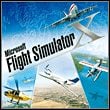Flight Simulator X: Cockpit Mooney Bravo
Hi! The following guide will cover the preparations for flight and the flight itself between the airports of Krakow (code EPKK) and Prague (code LKPR).
Let me begin with the Mooney Bravo cockpit description. You will not find much difference between this cockpit and cockpits of other Flight Simulator's light aircraft. If you are familiar with this particular cockpit, you may as well skip to the next paragraph.
Let's begin with the main panel.

Gauges of the main panel:
1 - alternator main switch | 2 - battery master switch | 3 - avionics switch | 4 - starter |
5 - aerodynamic brakes indicator | 6 - warnings indicator | 7 - navigation mode switch (NAV or GPS) | 8 - real time clock |
9 - autopilot master switch | 10 - Flight Director switch | 11 - marker beacon annunciator lights | 12 - DME indicators |
13 - autopilot panel | 14 - NAV2 Radio | 15 - fuel flow gauge | 16 - airspeed indicator |
17 - turn coordinator | 18 - fuel selector | 19 - attitude indicator | 20 - Horizontal Situation Indicator |
21 - standby vacuum pump switch | 22 - prop de-ice switch | 23 - Pitot heat switch | 24 - fuel pump boost switch |
25 - elevator trim switch | 26 - altimeter | 27 - vertical speed indicator | 28 - cowl flaps position indicator |
29 - cowl flap switch | 30 - flap position switch | 31 - throttle control | 32 - prop control |
33 - mixture control | 34 - magnetic compass | 35 - landing gear lever | 36 - rudder trim switch |
37 - flap position indicator | 38 - manifold pressure gauge | 39 - tachometer | 40 - rudder trim indicator |
41 - rudder trim indicator | 42 - fuel tank quantity gauges |
Radio and autopilot panel

Press Shift + 2 to open the panel. Radio and autopilot panel comprises the following gauges:
1 - audio switches used to listen to various radios and navaids;
2 - COMM1 section - the VHF1 radio section. Left part indicates current frequency, while the right part is used for storing backup frequency. Only that frequency can be edited and then set current using the arrow buttons.
3 - NAV1 section - radio receiver that is tuned to VOR transmitters. Frequencies are set similarly to the COMM1;
4 - COMM2 section - VHF2 radio section, frequencies are set similarly to the COMM1;
5 - NAV2 section - works similarly to the NAV1 section;
6 - DME indicator - left side shows the distance in nm to the VOR, right side shows our speed in relation to the VOR. R1 & R2 switches are used to choose the signal source - NAV1 and NAV2 respectively;
7 - transponder panel - the transponder squawk code is stored there using the digits;
8 - autopilot panel - lets you set the required altitude (ALT), vertical speed (VS) that is adjustable with the use of UP and DN buttons, enable the autopilot with the AP button and set HDG, NAV, APR, REV, ALT autopilot modes.
Autopilot modes:
HDG - the autopilot follows the set heading;
HDG - the autopilot follows the NAV course;
APR - the autopilot follows the ILS landing system indications;
REV - back-course type approach;
ALT - altitude change and holding.
Lights panel

1 - rotating beacon | 2 - taxi lights | 3 - strobe lights |
4 - recognition lights | 5 - landing lights | 6 - navigation lights |
Rotating beacon light is turned on before the engine start-up sequence and turned off after the engine shutdown. Taxi lights are used during taxiing and take-off. Landing lights are used during take-off and landing. Strobe lights are used before entering the runway and turned off after vacating the runway. Recognition and navigation lights should be turned on incessantly.
- Flight Simulator X Game Guide
- Flight Simulator X: Game Guide
- Flight Simulator X: Mooney Bravo
- Flight Simulator X: Cockpit Mooney Bravo
- Flight Simulator X: Cruise Mooney Bravo
- Flight Simulator X: In the aircraft ... Mooney Bravo
- Flight Simulator X: Time for the engine start-up Mooney Bravo
- Flight Simulator X: Taxiing Mooney Bravo
- Flight Simulator X: Time to go up Mooney Bravo
- Flight Simulator X: Flight Mooney Bravo
- Flight Simulator X: Preparation for landing Mooney Bravo
- Flight Simulator X: Landing Mooney Bravo
- Flight Simulator X: Taxiing to stand, parking Mooney Bravo
- Flight Simulator X: Mooney Bravo
- Flight Simulator X: Game Guide
You are not permitted to copy any image, text or info from this page. This site is not associated with and/or endorsed by the developers and the publishers. All logos and images are copyrighted by their respective owners.
Copyright © 2000 - 2025 Webedia Polska SA for gamepressure.com, unofficial game guides, walkthroughs, secrets, game tips, maps & strategies for top games.
